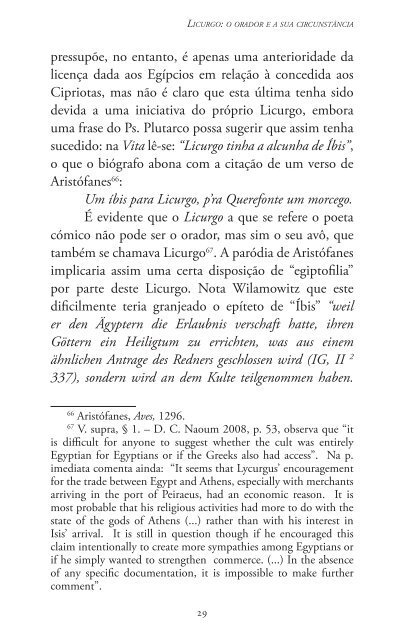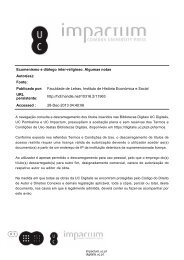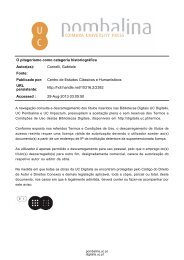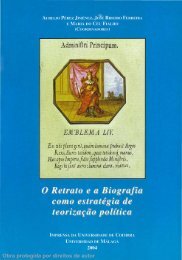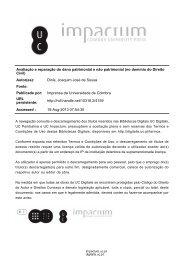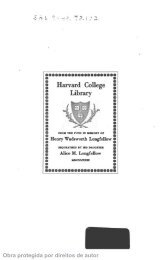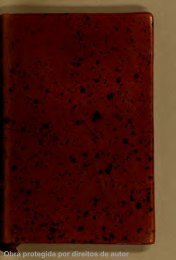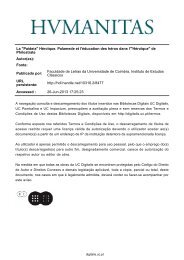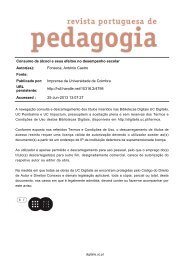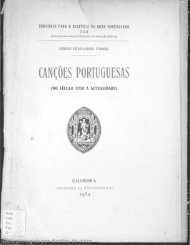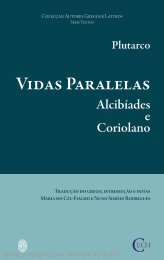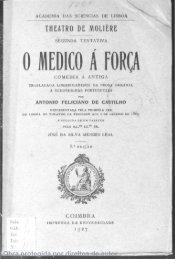- Page 1 and 2: Oração contra Leócrates Autor(es
- Page 3 and 4: Licurgo Oração Contra Leócrates
- Page 5 and 6: Ín d i c e Introdução Genealogia
- Page 7 and 8: J. A. Segurado e Campos enquanto Bu
- Page 9 and 10: J. A. Segurado e Campos 2. Formaç
- Page 11 and 12: J. A. Segurado e Campos 2.3. Seguin
- Page 13 and 14: J. A. Segurado e Campos poéticos,
- Page 15 and 16: J. A. Segurado e Campos depois de Q
- Page 17 and 18: J. A. Segurado e Campos supõe-se q
- Page 19 and 20: J. A. Segurado e Campos segundo qui
- Page 21 and 22: J. A. Segurado e Campos 5.2. Não
- Page 23 and 24: J. A. Segurado e Campos eventualmen
- Page 25 and 26: J. A. Segurado e Campos sem sucesso
- Page 27: J. A. Segurado e Campos 8. Polític
- Page 31 and 32: J. A. Segurado e Campos homem que s
- Page 33 and 34: J. A. Segurado e Campos 9.3. Sabemo
- Page 35 and 36: J. A. Segurado e Campos 9.6. O epis
- Page 37 and 38: J. A. Segurado e Campos talento. Ac
- Page 39 and 40: J. A. Segurado e Campos o facto de
- Page 41 and 42: J. A. Segurado e Campos 11.2. Afirm
- Page 43 and 44: J. A. Segurado e Campos económica
- Page 45 and 46: J. A. Segurado e Campos motivos tan
- Page 47 and 48: J. A. Segurado e Campos recuar quan
- Page 49 and 50: J. A. Segurado e Campos da cidade p
- Page 51 and 52: J. A. Segurado e Campos derrotado e
- Page 53 and 54: J. A. Segurado e Campos fugiu por m
- Page 55 and 56: J. A. Segurado e Campos cidade é p
- Page 57 and 58: J. A. Segurado e Campos imaginar qu
- Page 59 and 60: J. A. Segurado e Campos 12.8. Se a
- Page 61 and 62: J. A. Segurado e Campos 12.9. Um ou
- Page 63 and 64: J. A. Segurado e Campos retórico
- Page 65 and 66: J. A. Segurado e Campos 13. Fundame
- Page 67 and 68: J. A. Segurado e Campos dos túmulo
- Page 69 and 70: J. A. Segurado e Campos 13.4. Já B
- Page 71 and 72: J. A. Segurado e Campos Atenas venc
- Page 73 and 74: J. A. Segurado e Campos imitação
- Page 75 and 76: J. A. Segurado e Campos 14.5. Na se
- Page 77 and 78: J. A. Segurado e Campos a Atenas e
- Page 79 and 80:
J. A. Segurado e Campos o orador or
- Page 81 and 82:
J. A. Segurado e Campos oposto ao q
- Page 83 and 84:
J. A. Segurado e Campos 19 - O para
- Page 85 and 86:
J. A. Segurado e Campos 16. A absol
- Page 87 and 88:
J. A. Segurado e Campos Leócrates
- Page 89 and 90:
J. A. Segurado e Campos 17.4. Foi e
- Page 91 and 92:
J. A. Segurado e Campos ou mesmo re
- Page 93 and 94:
J. A. Segurado e Campos especial
- Page 95 and 96:
J. A. Segurado e Campos na sua argu
- Page 97 and 98:
J. A. Segurado e Campos 18.5. A ind
- Page 99 and 100:
J. A. Segurado e Campos 18.8. Merec
- Page 101 and 102:
J. A. Segurado e Campos contra Leó
- Page 103 and 104:
J. A. Segurado e Campos que os disc
- Page 105 and 106:
J. A. Segurado e Campos o patriarca
- Page 107 and 108:
J. A. Segurado e Campos Esta forma
- Page 109 and 110:
J. A. Segurado e Campos as ideias c
- Page 111 and 112:
J. A. Segurado e Campos sucede que
- Page 113 and 114:
J. A. Segurado e Campos predominant
- Page 115 and 116:
J. A. Segurado e Campos conheciment
- Page 117 and 118:
J. A. Segurado e Campos os jurados
- Page 119 and 120:
J. A. Segurado e Campos cepticismo,
- Page 121 and 122:
J. A. Segurado e Campos com o argum
- Page 123 and 124:
J. A. Segurado e Campos irracional
- Page 125 and 126:
J. A. Segurado e Campos 19.21. Mais
- Page 127 and 128:
J. A. Segurado e Campos votadas a l
- Page 129 and 130:
J. A. Segurado e Campos e desejar s
- Page 131 and 132:
J. A. Segurado e Campos ideal da ju
- Page 133 and 134:
J. A. Segurado e Campos desenvolvim
- Page 135 and 136:
J. A. Segurado e Campos fama lança
- Page 137 and 138:
J. A. Segurado e Campos familiares
- Page 139 and 140:
Cronologia 388 Esparta invade a Arg
- Page 141 and 142:
Cronologia 356 Filipe II toma Potid
- Page 143 and 144:
Cronologia 339 Filipe II e Atenas s
- Page 145 and 146:
Ora ç ã O CO n t ra LeóCrates 1*
- Page 147 and 148:
Licurgo se erguem nesta cidade e po
- Page 149 and 150:
Licurgo ameaçavam a pátria, aband
- Page 151 and 152:
Licurgo lei, fácil é recorrer a e
- Page 153 and 154:
Licurgo 14. Deveis, Atenienses, est
- Page 155 and 156:
Licurgo templos de Zeus Salvador e
- Page 157 and 158:
Licurgo Se não fizerem nem uma coi
- Page 159 and 160:
Licurgo receberam de Amintas quaren
- Page 161 and 162:
Licurgo convicção que, em process
- Page 163 and 164:
Licurgo consciência. A quem é que
- Page 165 and 166:
Licurgo deuses, e levando a traiç
- Page 167 and 168:
Licurgo está agora obrigado a soli
- Page 169 and 170:
Licurgo 48. Não são idênticos os
- Page 171 and 172:
Licurgo os crimes de sangue cometid
- Page 173 and 174:
Licurgo apressavam a regressar para
- Page 175 and 176:
Licurgo Assim como um homem enquant
- Page 177 and 178:
Licurgo da cidade. Toda a cidade co
- Page 179 and 180:
Licurgo da guerra contra Xerxes, e
- Page 181 and 182:
Licurgo nossos belos feitos, que vo
- Page 183 and 184:
Licurgo seu camarada nem desertar d
- Page 185 and 186:
Licurgo limitando-vos a observar co
- Page 187 and 188:
Licurgo salvação da comunidade? P
- Page 189 and 190:
Licurgo o punir com a morte 90 ? E
- Page 191 and 192:
Licurgo 99. O rei, vendo este poder
- Page 193 and 194:
Licurgo quando a troco de uma vida
- Page 195 and 196:
Licurgo nesta figura uma mãe que a
- Page 197 and 198:
Licurgo a ele os Espartanos vencera
- Page 199 and 200:
Licurgo outros se notabilizaram pel
- Page 201 and 202:
Licurgo Trasibulo 115 ; estes dois
- Page 203 and 204:
Licurgo indigno de vós pronunciar
- Page 205 and 206:
Licurgo que, no decorrer da guerra,
- Page 207 and 208:
Licurgo desrespeitavam a lei. Mas e
- Page 209 and 210:
Licurgo juramentos e da boa fé que
- Page 211 and 212:
Licurgo é preferível combater os
- Page 213 and 214:
Licurgo fazer amizade com Leócrate
- Page 215 and 216:
Licurgo dos traidores; e penso tamb
- Page 217 and 218:
Licurgo vida pela liberdade e deixa
- Page 219 and 220:
Licurgo 149. O meu propósito é pr
- Page 221 and 222:
Anexo (textos)
- Page 223 and 224:
D E J. A. Segurado e Campos verão
- Page 225 and 226:
B C J. A. Segurado e Campos as de c
- Page 227 and 228:
F 843 B J. A. Segurado e Campos A s
- Page 229 and 230:
E F J. A. Segurado e Campos delito
- Page 231 and 232:
C D J. A. Segurado e Campos leis be
- Page 233 and 234:
J. A. Segurado e Campos II DI o D o
- Page 235 and 236:
J. A. Segurado e Campos III Su D a
- Page 237 and 238:
J. A. Segurado e Campos V De m ó S
- Page 239 and 240:
J. A. Segurado e Campos que lhe for
- Page 241 and 242:
J. A. Segurado e Campos do seu triu
- Page 243 and 244:
J. A. Segurado e Campos agora de Li
- Page 245 and 246:
J. A. Segurado e Campos consideraç
- Page 247 and 248:
J. A. Segurado e Campos nunca terei
- Page 249 and 250:
J. A. Segurado e Campos não peço
- Page 251 and 252:
J. A. Segurado e Campos os que a so
- Page 253 and 254:
J. A. Segurado e Campos VII te x t
- Page 255 and 256:
J. A. Segurado e Campos IG, II, 333
- Page 257 and 258:
J. A. Segurado e Campos 32 ........
- Page 259 and 260:
J. A. Segurado e Campos o povo elog
- Page 261 and 262:
J. A. Segurado e Campos algum cargo
- Page 263 and 264:
Decelia: 120, 121 Delfos, oráculo
- Page 265 and 266:
a] Te x T o s Andócides: BiBliogra
- Page 267 and 268:
Dinarco: and notes by Ian Worthingt
- Page 269 and 270:
Hiperides: Hypéride Discours, text
- Page 271 and 272:
e Typographeo Clarendoniano, 1900 (
- Page 273 and 274:
vol. VI - The Fourth Century B.C.,
- Page 275 and 276:
Glotz 1906: Gustave Glotz, Études
- Page 277 and 278:
in Athens”, J.H.S., 106, 1996, pp
- Page 279 and 280:
Stroud 1998: Ronald S. Stroud, The
- Page 281 and 282:
8. Carlos de Jesus: Plutarco. Obras
- Page 283:
Em 1789 a Assembleia Nacional Franc


